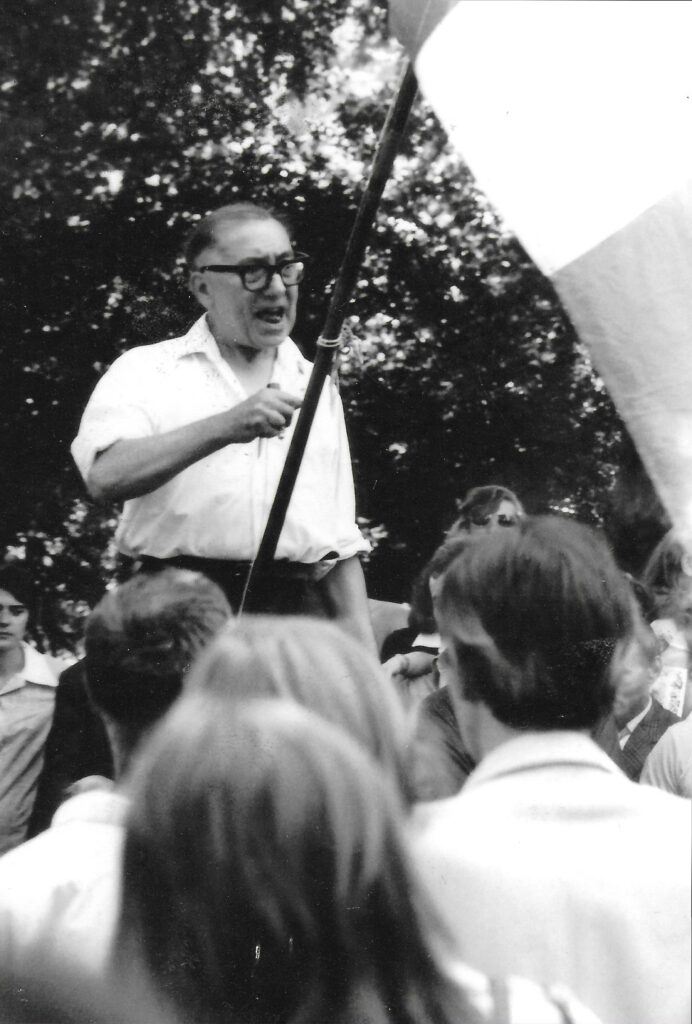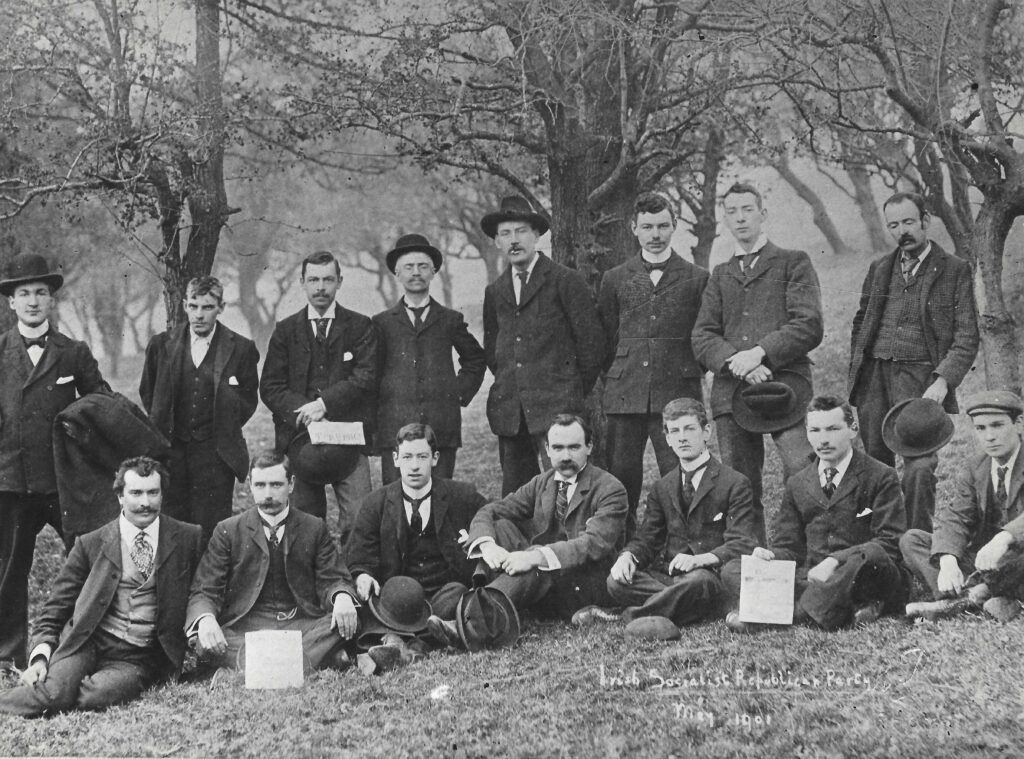Anthony Coughlan responds to Conor McCabe’s article, ‘Greaves, Connolly and the British Army’ (Platform, HI 33.3, May/June ’25).

Conor McCabe’s criticism of Desmond Greaves’s account of James Connolly’s British Army service as a teenager is much ado about nothing much. In doing research in the 1950s for The life and times of James Connolly, Greaves had the advantage of being able to interview some of Connolly’s contemporaries. Connolly’s children, Ina, Nora and Roddy, co-operated with him also.
It was John Conlon, a friend of Connolly’s brother John, who told Greaves that Connolly was born in Edinburgh, which the birth certificate then confirmed. This scotched the traditional view that Connolly was born in Ireland, which Connolly himself did nothing to discourage during his lifetime. Conlon also told Greaves that Connolly spent his teenage years in the King’s Liverpool Regiment of the British Army but that he had enlisted under a false name. John Connolly joined the Army under a false name too, but, while Conlon could remember John’s pseudonym, he could not remember James’s.
Conor McCabe’s article does not mention this false name point, for it means that written evidence from official records of Connolly’s army service did not and could not exist. But the circumstantial evidence, which Greaves cites below, is overwhelming.
Greaves deals with Connolly’s teenage British Army service in the last paragraph of Chapter 1 of The life and times and the first paragraphs of Chapter 2. This book is now available on the Greaves electronic archive at www.desmondgreavesarchive.com, together with all but one of Greaves’s other books (a new edition of his Liam Mellows and the Irish revolution, edited by Ruan O’Donnell, has just been published and will be put on the Greaves electronic archive website in eighteen months’ time), his two-million-word Journal and his Table-Talk (both of which I edited as his literary executor), the full file of the Connolly Association monthly, the Irish Democrat, which he edited from 1948 to 1988, and his more important articles.
Chapter 1 of The life and times gives what is surely a judicious historical assessment:
‘The fact of Connolly’s army service is attested in several ways. His adoption of a pseudonym rules out direct documentary proof. But there is ample evidence from the statements of contemporaries in Edinburgh, oblique references in his correspondence, his own statements to such friends as Mullery, the authority of Larkin, the surprising knowledge of Cobh he showed in an emergency in 1911, and finally his military proficiency. The evidence is part personal testimony, part inferential, but provides an intelligent, coherent picture, leaving little of importance to be explained … Those who reject this must tell us what else he was doing.’
Conor McCabe fails this challenge. He tells us nothing about those missing seven years in Connolly’s life. In my opinion, he is wrong when he writes in his article: ‘Ina Connolly … was surprised to learn from Greaves that her father was in the army. She said that her mother had never said anything about it.’ Here is Greaves’s Journal account, referring to a meeting with Ina Connolly in which she indicated that her mother, Lillie Reynolds, did in fact refer to her husband’s army service:
‘We then discussed the army service question. She is convinced that James met Lillie while in the British army in Dublin. Indeed, on a previous occasion she spoke of his being in Portobello Barracks. I well recall her start of surprise when a few years ago I asked her if she had ever heard he was in the army. Monteith had told her that the King’s Liverpool was the only likely regiment when she enquired of him. … Her sole reliance as far as army service evidence was concerned was a conversation at Arklow with Bill O’Brien and her mother. They told her that the fact that James was in the army was suppressed for fear that Sinn Féin would not trust him. She could not understand this, since the Fenians were in it.’
(Vol. 12, entry for 13 September 1956)
On Greaves’s reference to ‘the authority of Jim Larkin’ regarding Connolly’s army service, the Journal has the following:
‘After leaving her [i.e. Ina Connolly] I saw Desmond Ryan who told me that Larkin had announced that Connolly was in the Army at the ILP summer school in 1944. Michael Price [Republican Congress activist] had warned him it was true and to be careful. When John Leslie [Scottish socialist] wrote to William O’Brien about Connolly’s early life, he said, “There is one episode in Connolly’s life which though not discreditable is likely to be misunderstood and therefore I will say nothing about it”. About the army service he says he got it from William O’Brien who had it from Lillie Reynolds that Connolly had been in the army. Now Ina tells the story about being at Bray with her mother and O’Brien and hearing her mother ask O’Brien if he knew it.’
(Vol. 12, entry for 31 May 1957)

John Conlon’s account of Connolly’s army service was confirmed by John Mullery, one of Connolly’s ISRP members who was later friends with Connolly in New York. Mullery lived in Liverpool as an old man, a few miles from Greaves’s home, and they met several times. The Journal describes Greaves’s first meeting with Mullery as follows:
‘He was delighted to talk, told me Connolly was born in Edinburgh … Did I ever know how Connolly met his wife? He was in uniform at the time … Suddenly I realised I was in the presence of somebody who knew Connolly more intimately than anybody else and whose knowledge stretched further back, and dropped the subject of America … He ran for a tram for Kingstown or Blackrock at the corner of Merrion Square. The conductor did not stop, so he and an attractive young girl missed it together. That started the relationship, since they fell talking. There was never a cross word between them, but sometimes they would jokingly say, “That tram!”. The conductor had not seen them, he supposed. In those days the trams would stop anywhere they were hailed. I said I knew he was in the army. He told me that Connolly often spoke to him about it, in New York.’
(Vol. 12, entry for 10 June 1957)
There is not space to list the rest of Greaves’s evidence for Connolly’s British Army service—from Danny McDevitt, Peadar O’Donnell, Nora Connolly and others. Greaves kept copies of all the letters that he wrote to people when researching his biographies of Connolly, Mellows and Seán O’Casey. There are around a thousand such letters among his papers. I am currently sorting these for deposit in the National Library, as was his wish. He kept the replies too. His correspondence exchange concerning Connolly’s birthplace and British Army service is now on the website mentioned above, under ‘Articles and Pamphlets: James Connolly’. If readers click on this, they can judge for themselves. Volume 12 of Greaves’s Journal, covering the 1956–7 period when he was doing research on Connolly, is on the website also.
Greaves kept notes of interviews and document excerpts in standard reporters’ notebooks. There are nearly a hundred of these in the Greaves documentary archive, several dealing with his Connolly research, plus a card index referencing interviews with specific individuals in them. Greaves was a meticulous researcher. Few Irish historians will have left such detailed records of their work. I aim to deposit Greaves’s full Journal and all his Connolly research material in the National Library before the year is out.
Anthony Coughlan is Senior Lecturer Emeritus in Social Policy at Trinity College, Dublin, and C. Desmond Greaves’s literary executor.
